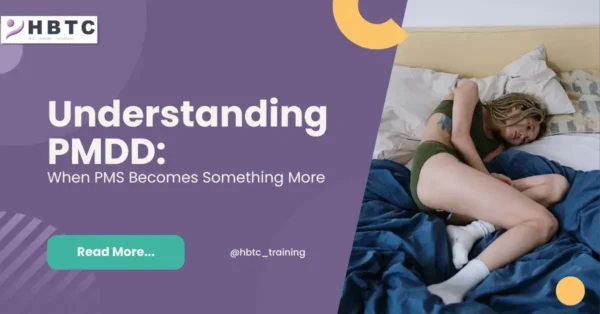Understanding PMDD: When PMS Becomes something more
While most people experience mild changes before their period, some face extremely severe symptoms that impact their well-being and daily functioning, a condition that is often overlooked and underdiagnosed. One important, yet often misunderstood condition that affects many people of menstruating age is Premenstrual Dysphoric Disorder (PMDD).
PMDD is far more than “just bad PMS.” It’s a serious condition that can affect both mental health and daily life, causing severe emotional, physical, and behavioural symptoms in the days or weeks leading up to a period.
What is PMDD?
Premenstrual Dysphoric Disorder (PMDD) is a severe form of premenstrual syndrome (PMS) that impacts around 824,000 people who menstruate in the UK.
While many experience mild PMS symptoms such as bloating or irritability, PMDD causes much stronger emotional and physical reactions, enough to disrupt work, relationships, and daily functioning. In severe cases, PMDD can cause suicidal thoughts or feelings of hopelessness. If you ever feel this way, it’s important to seek help and talk to someone you trust or a healthcare professional.
Common emotional symptoms include:

- Intense mood swings or tearfulness
- Anxiety, panic, or feeling “on edge”
- Depression or hopelessness
- Irritability or anger
- Difficulty concentrating
- Feeling overwhelmed or out of control
- Suicidal thoughts
Physical symptoms may include:
- Fatigue or low energy
- Headaches and joint pain
- Bloating or weight gain
- Breast tenderness
- Sleep or appetite changes
For many, these symptoms appear after ovulation and ease within a few days of the period starting, but during that time, they can be completely debilitating
Why does PMDD happen?
The exact cause of PMDD isn’t fully understood, but research suggests that people with PMDD have an increased sensitivity to hormonal changes during their menstrual cycle, particularly to shifts in oestrogen and progesterone.
Other factors that may contribute include:
- A family history of PMS, PMDD, or mood disorders
- Past trauma or chronic stress
- Smoking or certain lifestyle habits
- Genetic differences that affect how the body processes hormones and serotonin (a mood-regulating chemical in the brain)
Is PMDD a mental health problem?
PMDD is considered both a hormonal and a mental health condition. While its root cause lies in hormone sensitivity, the impact on mental well-being is profound, and in some cases, can lead to depression or suicidal thoughts.
Recognising this, PMDD is listed as a mental health disorder in the DSM-5 (the primary diagnostic manual used by clinicians). This classification helps ensure that those affected can access appropriate medical and psychological support.
If you ever experience severe emotional distress or suicidal thoughts during your cycle, it’s vital to seek professional help straight away. You’re not alone, and support is available.
Getting a diagnosis
Because PMDD symptoms overlap with other conditions, like anxiety, depression, or thyroid disorders, diagnosis can take time.
Healthcare professionals may ask you to track your symptoms across two or more menstrual cycles. Noting when symptoms appear and subside helps confirm if they follow the typical PMDD pattern (starting after ovulation and ending shortly after menstruation begins).
A diagnosis typically requires experiencing five or more key symptoms over multiple cycles, with clear evidence that they interfere with daily life.
Treatments and support options
PMDD is treatable. With the right combination of medical, lifestyle, and psychological support, many people find relief and regain control of their well-being.
Treatment may include:
- Lifestyle changes: Regular exercise, balanced nutrition, reducing caffeine and alcohol, and getting enough rest.
- Stress management: Mindfulness, meditation, or therapy to help manage emotional symptoms.
- Medication: Options such as SSRIs (antidepressants), hormonal treatments, or anti-inflammatory pain relief.
- Supplements: Some evidence supports vitamin B6, calcium, or magnesium to reduce symptom severity.
The best treatment plan varies from person to person, so working with your GP or a mental health specialist is key.
Where to get help
If you think you might have PMDD, speak to your GP or a healthcare professional. You can also find support from:
- Mind UK or ring 0300 102 1234
- NHS PMDD Information
- The PMDD Project
- Samaritans or call for free on 116 123
- 111 out of hours – they will help you find the support and help you need
- Call 999 if you feel you may be about to harm yourself
At HBTC, we have a list of different resources listed here: https://www.hbtc.co.uk/support/ on our website.
You’re not alone
PMDD can make even simple tasks feel impossible, but help is available, and recovery is possible. Raising awareness and encouraging open conversations can make a huge difference.
At HBTC, we’re committed to supporting wellbeing in the workplace and beyond. Whether you’re an apprentice, colleague, or employer, understanding conditions like PMDD helps us build a more compassionate, informed, and supportive community.
You may also be interested in…

Emily Simpson
Emily is our Digital Marketing/Learner Engagement Apprentice and is involved with all things social media and content development. She is also responsible for attending career events and maintaining relationships with local schools and colleges.


